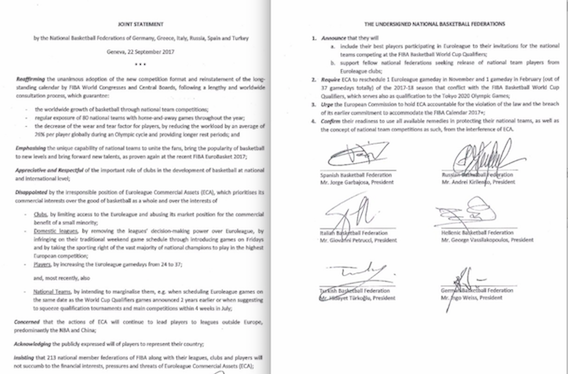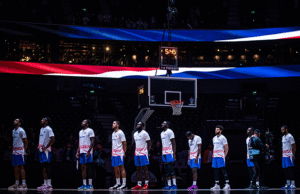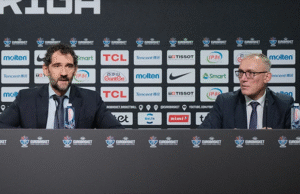FIBA has rejected calls to change the international calendar to avoid clashing with club games.
The governing body, in a virulent but occasionally bizarre rebuke to Euroleague’s proposal to move all national team competitions to July, claimed the move was a “heavy-handed diversionary tactic” amid cases which both sides have lodged with the European Commission.
It claimed the Euroleague is trying to engineer a move in the dates of the 2020 Olympic Games in Tokyo while insisting that the decision was only taken weeks ago to introduce a schedule that directly clashes with the new international windows in-season.
However in a counter-offer, FIBA officials are calling on Euroleague to move two of their game days to resolve an issue which threatens to prohibit a number of leading players from turning out for their country in the forthcoming World Cup qualifiers.
In a statement, they said: “This season it could perfectly start one week earlier, like many domestic leagues, and add just one double-header. Other alternatives are certainly possible too.
“The reality is that European Clubs Association considers the national teams an unnecessary and disturbing part of the basketball family and has therefore proposed to reduce their presence in the calendar even further, marginalising them into a small corner of the summer, which is clearly not the ideal moment for indoor sports and unnecessarily increases the players’ workload after a heavy club season.”
Ironically, it was added: “It is not time for further confrontation and FIBA has no interest in continuing a public exchange which damages the image of our sport.”
Yet hours later, a group of six federations issued a joint statement demanding that Euroleague – but not NBA clubs – release players for World Cup qualifiers. Germany, Greece, Italy, Russia, Spain and Turkey additionally called on the European Commission to sanction the league for breaking what they claim was firm commitment to the revamped calendar.

The letter was signed by Ingo Weiss, President of the German Basketball Federation; Andrei Kirilenko, President of the Russian Basketball Federation; George Vassilakopoulos, President of the Hellenic Basketball Federation; Giovanni Petrucci, President of the Italian Basketball Federation; Jorge Garbajosa, President of the Spanish Basketball Federation; and Hidayet Turkoglu, President of the Turkish Basketball Federation.
Do you like our work?
We have a tiny favour to ask. In 2018 we set out to make Hoopsfix sustainable by building our relationship directly with our readers. Up until now, Hoopsfix has been creating editorials, videos and podcasts to provide sorely missing coverage of the British game and its distinct culture and community.
We have funded Hoopsfix with our freelance work creating basketball media, but sadly that means not only does it fall behind our client’s priorities, but some of those clients are the same organisations we need to report objectively on putting us in a conflicted position.
We want to devote more time to our mission of helping British basketball reach its potential, and produce even more content for the basketball community by making Hoopsfix a sustainable 100% independent business funded directly by our readers through Patreon.
If everyone who enjoys our content chose to support us, our future would be much more secure. For as little as $3 per month, you can support Hoopsfix – and it only takes a minute.
We are tremendously honoured and humbled to have a community of people who value what we do, and we look forward to being at the forefront of the British game as it continues to evolve.








0 comments